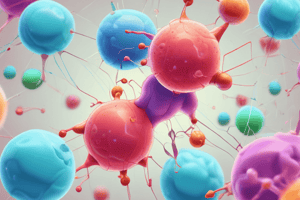Podcast
Questions and Answers
What was the primary significance of Tak Wah Mak's 1983 discovery regarding T-cell receptors?
What was the primary significance of Tak Wah Mak's 1983 discovery regarding T-cell receptors?
- It revealed the unique genetic sequence and origin of genes used for antigen recognition by T-cells. (correct)
- It identified a new method for provoking the body's overall immune response, applicable to all cell types.
- It explained the biochemical processes involved in the creation of T-cells, a complex aspect of cellular biology.
- It demonstrated that T-cells are produced by the thymus gland.
How did Tak Wah Mak's research contribute to the advancement of cancer treatment?
How did Tak Wah Mak's research contribute to the advancement of cancer treatment?
- By discovering that cancer cells can be converted back into normal cells through targeted gene therapy.
- By developing a universal vaccine effective against all types of cancer cells, eradicating the disease.
- By applying molecular techniques to understand immune responses to cancer, and identifying a chemical to block the fuel supply of Hodgkin's lymphoma. (correct)
- By developing a method to completely eliminate cancer cells from the body without affecting healthy tissues.
What aspect of T-cells did Tak Wah Mak's early research primarily focus on?
What aspect of T-cells did Tak Wah Mak's early research primarily focus on?
- The role of T-cells in transporting oxygen throughout the body, which he found influences immunity.
- The structural composition of T-cell membranes and their interaction with lipids.
- The mechanism by which T-cells recognize antigens, which is essential for initiating an immune response. (correct)
- The metabolic processes within T-cells that regulate energy production, affecting their longevity and activity.
What was the significance of Tak Wah Mak detailing the genetic encoding of human T-cell receptors in the 1984 edition of 'Nature'?
What was the significance of Tak Wah Mak detailing the genetic encoding of human T-cell receptors in the 1984 edition of 'Nature'?
In what way did Tak Wah Mak's approach to studying cancer and immunology differ from previous methods in the field?
In what way did Tak Wah Mak's approach to studying cancer and immunology differ from previous methods in the field?
Flashcards
What are T-cells?
What are T-cells?
A type of white blood cell produced by the thymus gland, crucial for the body's immune response.
What are antigens?
What are antigens?
Substances that trigger the body's immune response.
Mak's T-cell Discovery (1983)
Mak's T-cell Discovery (1983)
Genes of T-cell receptors have a unique sequence and origin.
Mak's cancer research
Mak's cancer research
Signup and view all the flashcards
Hodgkin's lymphoma treatment (1999)
Hodgkin's lymphoma treatment (1999)
Signup and view all the flashcards
Study Notes
- Tak Wah Mak is an immunologist and molecular biologist.
- Mak discovered how T-cells recognize antigens.
- T-cells are part of the body's immune system.
- Mak's work advanced the understanding of cancer cells at a molecular level.
- Mak was born in southern China in 1946.
- Mak's father was a wealthy silk trader.
- Mak spent his childhood in Hong Kong.
- Mak moved to the U.S. with his family and studied at the University of Wisconsin.
- Mak earned a Ph.D. in biochemistry from the University of Alberta, Canada, in 1968.
- Mak's research on T-cells, produced by the thymus gland, helped solve a problem in immunology.
- He solved how receptors on the surface of T-cells recognized antigens.
- Antigens are substances that provoke the body’s immune response.
- In 1983, Mak discovered that the genes of T-cell receptors used for antigen recognition have a unique genetic sequence and origin.
- Mak's discovery opened a new chapter in the study and treatment of immune system diseases.
- Mak applied molecular techniques to learn more about immune responses to cancer.
- Tak Wah Mak quote from 2011: "We can never give up the fight against cancer."
Milestones
- Tak Wah Mak became a fellow at the Ontario Cancer Institute in 1972 after completing his doctorate.
T-Cell Findings
- Genetic encoding of human T-cell receptors was detailed in Nature journal's March 1984 edition.
Genetic Research
- Experiments with mice to isolate genetic function for cancer and immunology studies occurred in 1988.
Targeted Treatment
- In 1999, a chemical to block the fuel supply of Hodgkin's lymphoma, a rare form of cancer, was identified.
Studying That Suits You
Use AI to generate personalized quizzes and flashcards to suit your learning preferences.
Description
Tak Wah Mak is renowned for his work on T-cells and antigen recognition, significantly advancing the understanding of immune system diseases and cancer at the molecular level. His groundbreaking discovery in 1983 revealed the unique genetic sequence of T-cell receptors, revolutionizing immunology. Mak's research has had a transformative impact on both the study and treatment of immune-related diseases.




